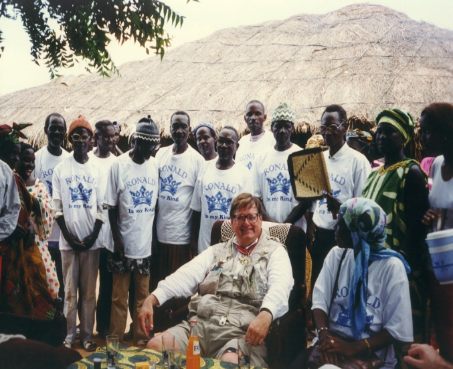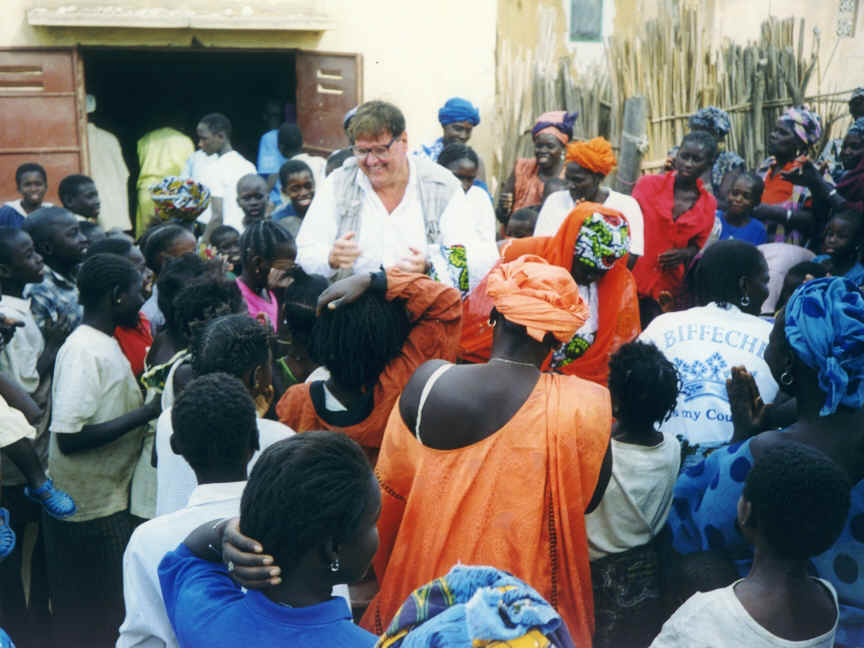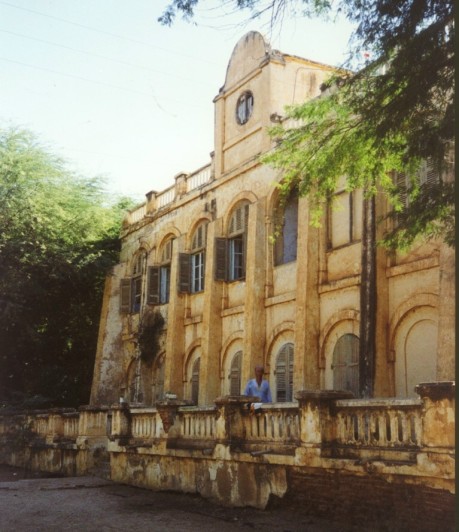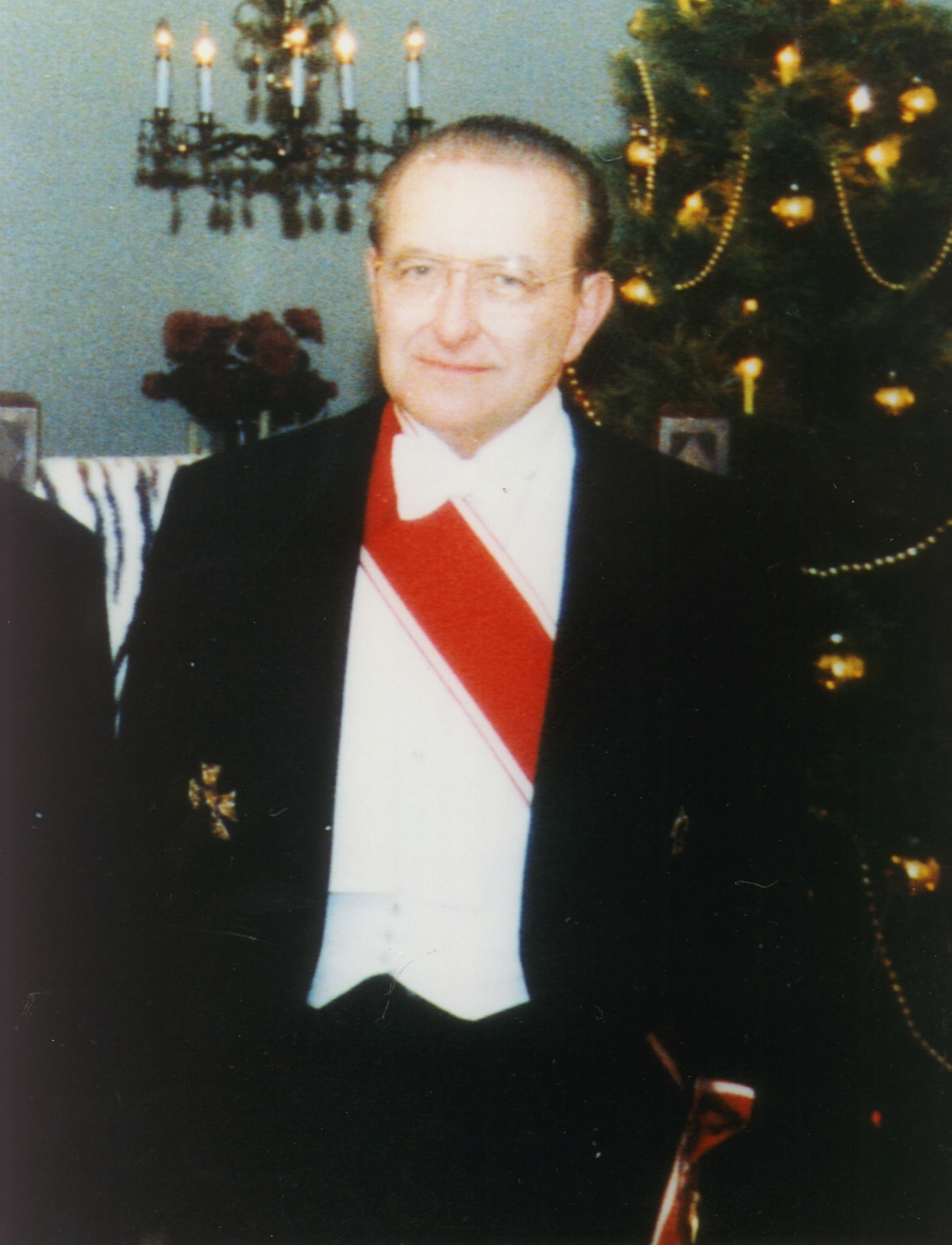
H.M. King Ronald I of Biffeche meeting with Conseil des Anciens.
BIFFECHE HISTORY
[Adapted from a traveler's note on Biffeche]
The Kingdom of Biffeche is a tiny West African Kingdom that is unusual in that it has had non African born Kings for the last five decades.
Biffeche is on the north border of Sénégal, West Africa, and it includes a small part of Mauritania.In antique maps dating back at least to 1726, it appears in the Sénégal River delta, between the Sénégal River and the Marigot de Lampsar (a "marigot" is an arm of the river) about 25 kilometers northeast of the coastal city of Saint-Louis, Sénégal. The origins of the Kingdom are obscure but very ancient; it is mentioned in XVIII-Century French documents along with the ancient Kingdom of Waalo. In about 1960, a group of Roman Catholic people of the Sérér-Mont-Roland tribe were transported to the semi-desert of Biffeche from Mont-Roland in central Sénégal. They come from the oldest ethnic group in Sénégal, the Sérér, one with a vivid history of Kingdoms and Empires. They speak the Ndut variant of the Sérér language.
Having been "resettled", they were in desperate straits at first, and nearly starved. They were promised various kinds of support that they didn't get. Their new fields were arid and became salty and barren. The story is that in 1963 they could not settle upon a new King at the time; instead of choosing one of their own people they asked their priest, Father VAST, for guidance. He advised them to choose the person who had helped them the most during their plight.
That person was one Edward Charles Schafer. Although born in the United States, Edward Schafer was a cousin to both of the Hohenzollern ruling family of Germany and the Habsburg ruling family of the Austro-Hungarian empire. An active businessman who owned various radio and television stations in America, he was asked by the Roman Catholic Cardinal of St. Louis to form a committee to aid the needy people of Biffeche. Assisted by Henrietta Bulus, a Sénégalese-Lebanese woman, who had immigrated to St. Louis, Missouri, Edward Schafer put together a group that raised money and sent aid to the people of Biffeche.
The newly settled population in Biffeche, petitioned Guné Ko Ka Weex Tené, the 99th King of Biffeche, to grant the boon of requesting that Edward Schafer be made King of Biffeche. Guné Ko Ka Weex Tené was childless and as always wishing to help his beloved peoples agreed to their request. The Biffeche elders mailed him some symbolic skins, a packet of holy grains, sacred seeds and a notification in French that he was the King.
Edward Schafer journeyed to Washington DC for a meeting with G. Mennen Williams under secretary of State for African Affairs. Through G. Mennen Williams, the United States State Department presented no objections to the new arrangement. The 100th King of Biffeche was enthroned as Edward I by the Grace of God, by the Will of Allah, Protected by the Great White Leopard. The year was 1963 ce, 1393 ah in the Islamic calendar.
After humbly accepting what he felt to be the Will of God, the Will of Allah and the Will of the Great White Leopard, Edward I found that he enjoyed being King. For more than 30 years, he diligently helped the people in various ways, and issued Royal directives by mail, he never visited his Kingdom. He sent them money and other aid, got agricultural experts to advise on their crops, and did various other things for them. He ruled (very rarely) simply by making his wishes known through correspondence with Pierre Claver Faye, the local native Chef de Village (and later Baron Savoigne) of Biffeche. Edward was completely accepted as King by all the Biffeche people. They were very poor, even by West African standards, and they were proud of having a King"so important that he lives in America."
The late Empress Zita of Austria-Hungary addressed him royally as "Cousin," and Prince Charles (of the U.K.) once told him he was envious because it was so much simpler to become King of Biffeche than to wait decades for the throne as Prince of Wales. The Pope gave his Apostolic Blessing to "H. M., Edward I."
Once a year Edward would have a house party, dress regally, and receive his court. He was known to the press in the United States of America, as the King of Biffeche, and Esquire magazine had an article on his Kingdom. The Roman Catholic Archbishop of Saint Louis, H. E., Cardinal Ritter, would always, during his regular Sunday procession to the altar of the Cathedral, pause and acknowledge the King. For Edward was "by the Grace of God, King of Biffeche."

The Royal flag of Biffeche is in three sections divided vertically, from left to right blue-white-blue with a blue crown in the center section.
The coat of arms is emblazoned: Argent within a bordure azure a crown azure.
A Royal Biffeche anthem was composed in 1971 by Sir Alphonzo D'Artega, a member of the Rome Symphony; it is short but hard to sing.
ANTHEM
Sir Alfonzo D'Artega, Rome Symphony, 1971
Be-side the ar-id SANDS,
bles-sed king-dom in God's HANDS,
we sa-lute the crown and sign [i.e. holy symbol]
and we hail our king
In Bi-ffeche we want to BE
in the home of the FREE
There's no need for the SWORD,
we're pro-tec-ted by the LORD [i.e. God]
May our flag of blue and white
Stand un-FURLED be-fore the WORLD
and we pray to God a-BOVE
to shower our coun-try with his LOVE.
The Kingdom of Biffeche has various orders and decorations: the Order of the Crescent for Muslims who help the populace, the Order of the Raven for Christians, and several others.
At the Royal capital, "Old Biffeche City," the fields for rice-growing were unsuccessful; they became salty due to various causes. The water for irrigation came from the nearby Marigot de Djeuss, which itself contained some sea-water. Eventually the Christian people gave up and moved to a different town upstream called Savoigne, though Old Biffeche City (renamed Al Madinatoul Islamiah Mboubène Peulh) remained the official capital of the Kingdom. At Savoigne they were more successful, and some families actually prospered. At Old Biffeche (Mboubène), the Muslim Peulh people took the place of the Christians, but they had no more success with the salty fields.
Sadly our beloved King Edward died without children. Shortly after Edward I came to the throne, he had come to rely upon Ronald of Inneryne. During World War II, as Germany was bombing the British Isles, and the Nazi's had commandeered his family's German properties, Ronald was born in America. Related on his mother's side to the old Swedish Royal family, putative heir to Germany's Duchy of Orlemunde, and destined to be Scotland's Baron of Inneryne upon the death of his father, Ronald was one of the few people in America who believed in and understood the problems of monarchy. Over the more than three decades of his rule, Edward I had placed Ronald in more and more areas of trust. Therefore, before he died in 1997, he executed an Act of Succession abdicating the throne and designating Ronald as his successor. Ronald became the 101st King of Biffeche.
Unlike Edward, King Ronald immediately visited the Kingdom, along with his 30-year-old son Crown Prince Christopher and a team of interpreters. He had never been to Sénégal or Mauritania in his life, spoke none of the relevant languages, and had no idea how he would be received by the locals in those countries or in Biffeche itself.
When he got out of his vehicle he was a shock to the populace. Few westerners visit the Kingdom. "Who are you?" they asked. "We are the King," he said. There was a long pause after the meaning was made clear; then: "Oh, but no, our King is Edward, in America." "Edward has died," he told them. "We have waited 30 years for our King to visit. We thank God you have come at last ..." Ronald was apparently welcomed by all. Inside the little huts were faded photographs of the late King Edward of Biffeche whom they had never seen.
The people put out an armchair with a white lace antimacassar for the new King to rest in, while a respected elder of the village cooled him with a woven fan. He was given meals and he met with the council of elders and later the whole group. He asked "What do you need?" and they promptly came up with a long list of needs.



